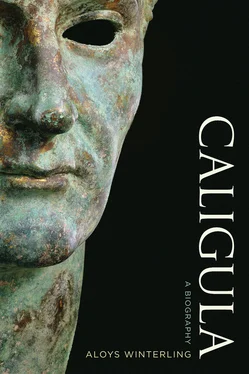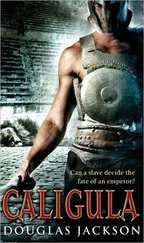Usually it was not only the family fortune that was passed on from father to son in aristocratic families in ancient Rome; sons also inherited the close relationships within the aristocratic society, alliances known as “friendships,” as well as any political prestige that the father had enjoyed with the people of Rome and the soldiers of the Empire. If the emperor had a son or had adopted one, that son was thus automatically destined to be the successor. Women, especially wives or daughters of an emperor, could also play a crucial role in the question of succession if they had a son from a previous marriage or had given birth to a grandson of the emperor. As a result family relationships acquired great political significance, which could destabilize the position of a reigning emperor as well as support it.
Although Augustus had no son of his own, he did have a daughter, Julia, from a former marriage. His second wife, Livia, for her part had brought two sons with her into the marriage: Tiberius, the later emperor, and Drusus (known as Drusus I, or Drusus the Elder). Augustus chose to signal and secure his choice by arranging for the presumptive successor to marry Julia: first his nephew Marcellus and then, after Marcellus’s early demise, his chief general and associate, Marcus Agrippa. When Agrippa also died in 12 B.C. Augustus adopted his two grandsons from Julia and Agrippa’s marriage, Gaius and Lucius, who thus became candidates for the throne. Both of them also predeceased Augustus, however, so that the choice finally fell on his stepson Tiberius. He, too, had to marry Julia, and of all the candidates was the one who actually lived to become her father’s successor.
The politics of the imperial family had, however, produced other aspirants for the throne. Augustus had married off his second stepson, Drusus, to his niece, Antonia II (Antonia Minor, Antonia the Younger). At the time of Drusus’s death in 9 B.C. they had two sons — Claudius, the later emperor, and Germanicus — who were thus great-nephews of the emperor. Claudius received little notice initially because of a physical handicap, but for Germanicus a marriage was arranged with Agrippina the Elder, Augustus’s granddaughter from the marriage of Julia and Agrippa. Germanicus and Agrippina’s children included three sons: Nero (not the later emperor), another Drusus (III), and Caligula. At the time of Augustus’s death they were all still children, but unlike Tiberius they acquired the prestige of the imperial family by virtue of being the first emperor’s biological great-grandchildren and great-great-nephews. Augustus “solved” this problem by requiring Tiberius to adopt Germanicus, thereby opening the way to the succession for his great-grandchildren. The fate of Tiberius’s own son, Drusus II (Drusus the Younger) remained undecided. An attempt was made to resolve it by arranging further marriages between the different branches of the imperial family. Thus Drusus the Younger married Livilla, Augustus’s great-niece, while Livilla’s daughter in her turn married one of Germanicus’s sons, Nero. One last grandson of Augustus, named Agrippa Postumus, from the marriage of Julia and Agrippa, had fallen into disfavor for reasons that remain unclear. He was murdered in the year 14, possibly on Augustus’s own initiative or that of Livia or Tiberius.
These complicated family relationships — difficult not only for modern prosopographers, but probably also for contemporaries to keep straight — signal a central problem that resulted directly from Augustus’s construction of the Principate. Because he chose to forgo a hereditary monarchy and thus the concomitant legal clarification of the succession, he found it difficult to control the political prestige derived from blood relationships to the emperor. Rivalries could arise within the imperial family, which in turn offered ideal openings for groups of aristocrats to back possible successors. Sometimes these alliances developed into conspiracies. Augustus’s own daughter, Julia, started the ball rolling. In the year 2 B.C. she was banished because of her contacts with young aristocrats in Rome, including Iullus Antonius, the son of the triumvir Marcus Antonius, who had been Augustus’s last remaining rival in the civil war. Whether adultery was involved, as the official charge claimed, or a political conspiracy, as many suspected, is in the last analysis irrelevant. If the daughter of the emperor, whose three marriages had created presumptive candidates to succeed him, entered into a close relationship with a high-ranking aristocrat, that in itself amounted to an important political development that threatened the emperor, regardless of what her own motives may have been.
Similar events would occur repeatedly over the decades that followed. All these conspiracies, real or imagined, and the punitive reactions to them meant that when the emperor Nero died in the year 68, not a single descendant of Augustus remained alive. This complete disappearance of the imperial family can hardly be judged in moral terms. It resulted from the political relevance of those familial relationships and the potential mortal danger menacing all the emperor’s kin.
A CHILDHOOD AS “LITTLE BOOTS”
Caligula spent his first seven years in Germania, Rome, Greece, and the Orient. As many sources attest, his father, Germanicus, who had risen to the status of prince through Augustus’s adoption arrangements, enjoyed great popularity in all parts of society on account of his good looks and genial personality; he was made commander of the Roman legions on the Rhine in the year 13. His task there was to lead a campaign against the Germanic tribes east of the river, who had inflicted a major defeat on the Romans in the Teutoburg Forest a few years earlier. Germanicus’s wife, Agrippina, followed him, and soon afterwards their small son was sent north to join them, too. He thus spent his early years in a military camp. Supposedly it was Agrippina, known to take an active interest in military affairs, who hit on the idea of dressing little Gaius in a kind of miniature legionary’s uniform, as a form of flattery to the soldiers and designed to win their affection. He acquired his nickname, “Caligula,” from the little soldier’s boots he wore, and it stuck to him for his entire life.
Agrippina had anticipated the soldiers’ reaction correctly. The little boy became the favorite of the legions’ camp. After the death of Augustus, when the armies of the Rhine mounted a dangerous mutiny and tried to proclaim Germanicus emperor even against his will, the child is thought to have played a decisive role. When the precarious situation prompted the commander to send his wife and child to safety in Trier with their retinue, the solders are supposed to have become ashamed and called off the uprising. According to another source they took Caligula hostage to prevent his removal from the camp.
In early summer of the year 17 the family returned to Rome, where Germanicus was honored with a triumph for his campaigns against the Germanic tribes. Such a procession to celebrate a commander’s victories was the traditional apex of an aristocrat’s career, and a huge enhancement to his family’s prestige, but a goal achieved by very few. Germanicus’s triumph is said to have been staged with exceptional pomp. Trophies, prisoners, and depictions of the mountains, rivers, and battlefields were included, so that the Roman public could get a vivid picture of the popular general’s feats. Caligula, not quite five years old, and his four siblings stood at the center of the grand display with which the city celebrated Rome’s military success in the North and honored Germanicus: “To the spectators the effect was heightened by the noble figure of the commander himself,” writes Tacitus in his Annals , “and by the five children who loaded his chariot” (2.41.3).
Читать дальше




